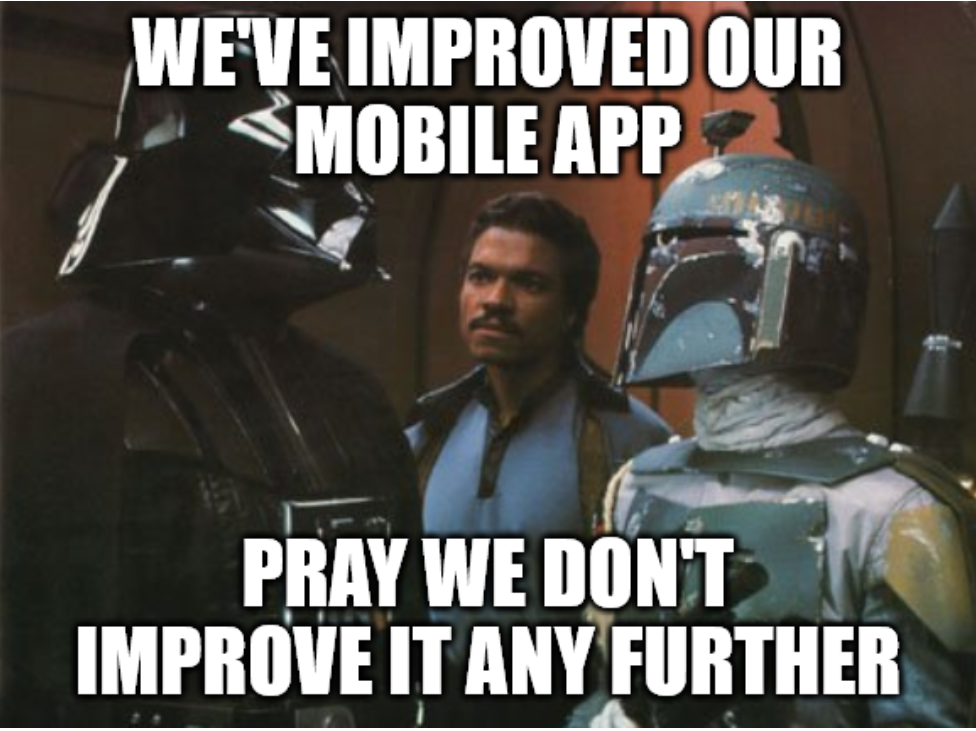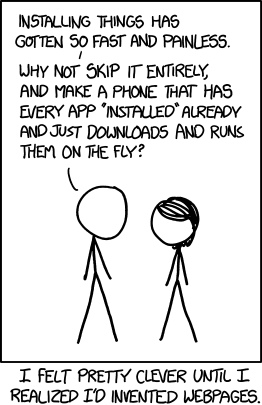app
This article is a stub. You can help the IndieWeb wiki by expanding it.
App typically refers to a native app, usually a less functional version of a web site that is restricted to one or more proprietary platforms, but may also refer to the .app top level domain setup by Google that requires HTTPS.
How not to
If you have a webapp, please avoid prompting the user to switch to using a native app. This is such a user annoyance that XKCD made a comic about it:
"Try our app! It's exactly like our webpage except its not always bugging you to try our app."[1]
Disadvantages
Native apps have disadvantages compared to webapps.
apps break linking
- Content inside apps is not linkable. If you find a news article on a website, you can link to it and share it by passing the URL around.
- Or in the rare case of app deep linking being implemented, it's slow, doesn't zoom, etc.[2]
Criticism
- Apps have potential security vulnerabilities: instead of simply rendering text in your browser and executing sandboxed JavaScript, apps have the ability to use device APIs including accessing the phone and address book functions. Apps have been known to upload a user's full contact list details.
- New York Times: Mobile Apps Take Data Without Permission
- On iOS, apps including Path have leaked contact details back to their corporate owners.
- Facebook added @facebook.com email addresses to Android address books. (And in 2014, Facebook are now deprecating @facebook.com email addresses due to lack of use.)
- Apps use up storage space on the device. The app for BBC or CNN or the New York Times will sit there and use up the sometimes limited storage space even when not in use. Websites leave cache data and cookies, but if you don't visit a site for long enough, it'll just disappear from your device. This is inherently unscalable. There are billions of websites: should each one become an app? You wouldn't download an app on your desktop or laptop computer just to look at a website: why do it on a mobile phone?
Why you might need an app
- Known found that their most common request was for an app, for offline use and better posting of media like large photos and videos. This has been echoed by many of their customers.
We may take issue with the above for ideological or technical reasons, but customer / user demand usually trumps these concerns.
- Mobile browsers are typically very bad at uploading large content. Web audio APIs are flaky, and the browsers often crash after several uploads.
- It is impossible to upload a 1GB video using a mobile browser over a cellular connection - but an app can manage the upload intelligently.
- Video and audio compression is easier in an app than in a browser.
- App interfaces are typically more responsive.
- Push notifications are easier in apps (although modern web standards are making it easier to send asynchronous push notifications across platforms).
In short, the web is great for cross-platform content consumption, but mobile web browsers are often suboptimal at providing publishing assistance.
Articles
- 2013-02-02 No, I'm not going to download your bullshit app
- 2014-02-24 App-pocalypse Now
- 2015-05-25 10 things to consider about the future of web applications
- 2024-12-30 : Your App Should Have Been A Website (And Probably Your Game Too)
app top level domain
.app is a top level domain that requires HTTPS and was opened to limited registration on 2018-05-01, with availability to the general public on 2018-05-08.
See Also
- platform
- API
- 2014/SF/apps
- appaccess
- 2016-05-25 NYT: A 32-Hour Webcast of Norwegians Reading the Fine Print
Emphasis added.A Norwegian consumers’ group produced a 32-hour webcast of a team of readers going through the fine print of terms and conditions of downloadable apps.
Finn Myrstad of the Norwegian Consumer Council, a government agency, said the idea was to point out the absurdity and possible illegality of some of the conditions.
- 2018-07-10 Popular Science: On the 10th anniversary of the App store, it’s time to delete most of your apps
- https://twitter.com/justinkan/status/1081330663133855744
- "Start building your MVP with a website, not a mobile app. Websites are:
1) easier to launch
2) cheaper to acquire customers
3) scalable
4) more easy to monetize
read more from @JuliaEnthoven, CEO of @KapwingApp https://www.atrium.co/blog/founders-should-build-website-not-mobile-app/" @justinkan January 4, 2019
- "Start building your MVP with a website, not a mobile app. Websites are:
- https://twitter.com/scottjenson/status/1199872004066643968
- "I don't understand why all social services don't *start* with a web page then optimize with an app.
Of course your primary usage will be the app but the web page covers the long tail of all the use cases you didn't consider" @scottjenson November 28, 2019
- "I don't understand why all social services don't *start* with a web page then optimize with an app.
- https://twitter.com/jack/status/1454650148911411200
- "apps have distracted me from just how powerful the web is" @jack October 31, 2021
- Criticism: "pulled due to age" (e.g. Indigenous on iOS), not a problem with websites (a single centralized OS vendor or App Store vendor being able to decide to "pull" a website)
- 2022-11-27 jwz: PSA: Do Not Use Services That Hate The Internet
If posts in a social media app do not have URLs that can be linked to and viewed in an unauthenticated browser, or if there is no way to make a new post from a browser, then that program is not a part of the World Wide Web in any meaningful way.
- criticism: https://wandering.shop/@Kirabug/110652409195304979
- "“It’s better in the app”Well then fix your fucking website. Don’t make it my problem." @Kirabug July 3, 2023
- Criticism: https://wandering.shop/@charliejane/111235925405738004
- "My crankiest opinion: I hate apps.Most apps are just clingy bitches. They want to collect too much info, they take up too much space, they want to notify you of trivial bullshit. Most apps should just be websites." @charliejane October 14, 2023
- https://chaos.social/@henryk/111535296749683175
- "@mcc" @henryk December 6, 2023
- ^



